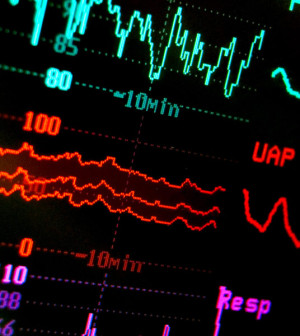- 8 Ways to Increase Dopamine Naturally
- 7 Best Breads for Maintaining Stable Blood Sugar
- Gelatin vs. Collagen: Which is Best for Skin, Nails, and Joints?
- The Long-Term Effects of Daily Turmeric Supplements on Liver Health
- Could Your Grocery Store Meat Be Causing Recurring UTIs?
- Are You Making This Expensive Thermostat Error This Winter?
- Recognizing the Signs of Hypothyroidism
- 10 Strategies to Overcome Insomnia
- Could Artificial Sweeteners Be Aging the Brain Faster?
- Techniques for Soothing Your Nervous System
Kidney Procedure Might Help Ease Tough-to-Treat High Blood Pressure


A new therapy may help lower tough-to-treat high blood pressure in people with chronic kidney disease, a new study finds.
“Blood pressure that is difficult to control, even on multiple medications, in patients with chronic kidney disease is a significant issue,” explained an expert who was not connected to the new study, Dr. Adam Auerbach.
“Poorly controlled blood pressure can lead to worsening kidney function, heart disease and stroke,” said Auerbach, who is a cardiologist at North Shore University Hospital in Manhasset, and Long Island Jewish Medical Center in New Hyde Park, N.Y.
The new technique is called renal (kidney) denervation, and involves the interruption of a key nerve in the kidney. It is a minimally invasive, catheter-based procedure that uses radio waves to heat and remove tissue.
The study included 15 people averaging 66 years of age. All had chronic kidney disease along with high blood pressure that had proven resistant to standard drugs, even though the patients were taking at least three medications to lower their blood pressure.
All of the patients underwent renal denervation and were followed for one year. During that time, the patients were treated with an average of five different medications for high blood pressure.
The patients’ blood pressure decreased significantly during the follow-up and their kidney function remained stable and did not further deteriorate, the researchers noted.
The small pilot study suggests that “treatment with renal denervation decreases blood pressure, and most important, slows or even halts the decline of [kidney] function in treatment-resistant patients with chronic kidney disease,” study lead author Dr. Roland Schmieder said in a news release from the American Heart Association.
Auerbach cautioned that renal denervation “is in addition to taking medications, it does not replace them.” He added that “this is a promising procedure, but the number of patients in this study was small and further investigation is needed.”
Another expert was similarly cautious.
While the finding could be of “great clinical significance” to patients, “it remains to be seen if this stoppage of renal function decline by renal denervation therapy translates into lives saved or [heart attacks] prevented,” said Dr. Sripal Bangalore, assistant professor in the department of medicine at NYU Langone Medical Center in New York City.
“Nevertheless, if these results are replicated in other large trials this could potentially be a game-changer for patients with kidney disease and resistant hypertension [high blood pressure],” Bangalore said.
The study is scheduled for presentation Nov. 20 at the annual meeting of the American Heart Association in Dallas. Findings presented at medical meetings are typically considered preliminary until published in a peer-reviewed journal.
More information
The American Academy of Family Physicians has more about high blood pressure.
Source: HealthDay
Copyright © 2026 HealthDay. All rights reserved.










